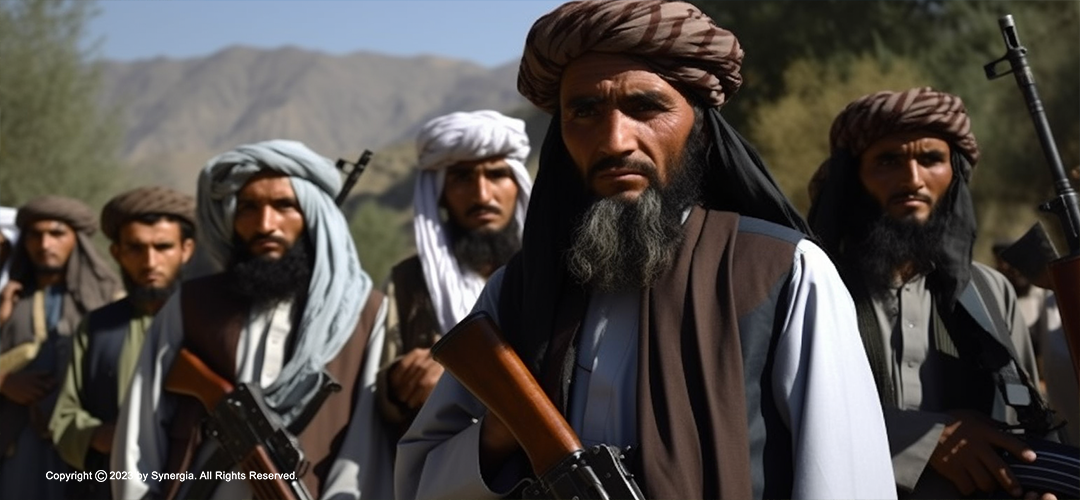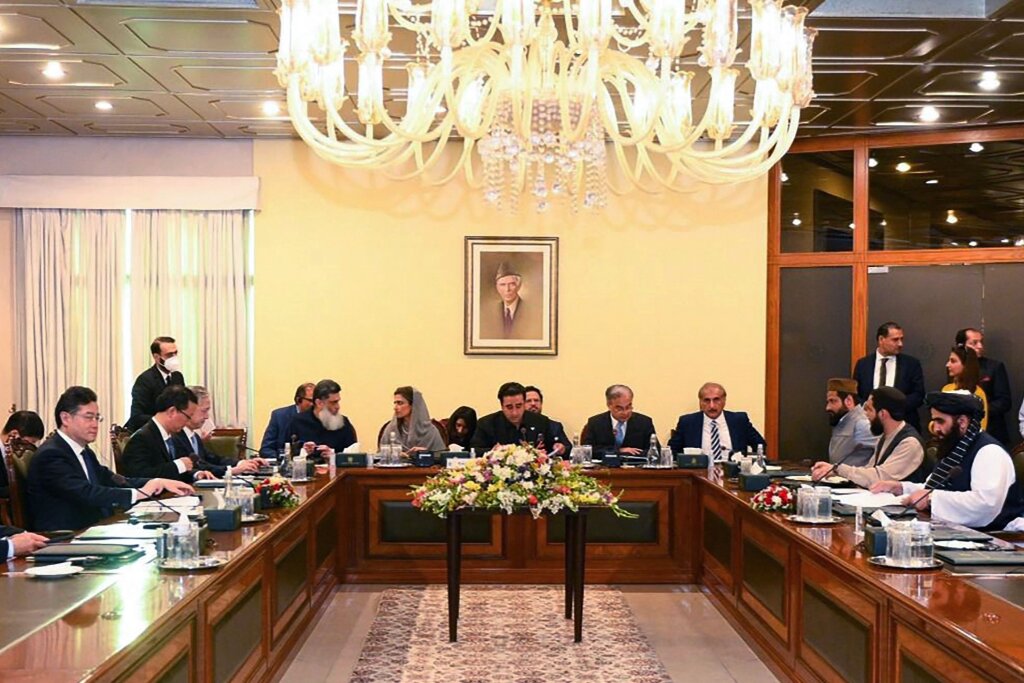Cutting the Afghan Gordian Knot
May 12, 2023 | Expert Insights

Shadowed by the tumultuous political upheavals in Pakistan, China held a meeting in Islamabad last week to chart out a roadmap for the rehabilitation of Afghanistan, nearly two years into Taliban rule.
That China took the initiative to bring together the Pakistanis and the Afghanis at the same table, after both have been incessantly exchanging accusations (and at times rifle fire) underscores the threat that continued instability in Afghanistan portends to the region. China, with its restive Muslim-dominated western provinces, cannot allow the situation to worsen in Afghanistan to infect its own Uighurs.
Background
Afghanistan, with its rich economic promises and its potential to export trouble to its neighbours, has always fascinated China. While allowing the Pakistani military to play the central role in the byzantine machinations that make up the Afghan political scene historically, China has maintained a close connection with the country, especially with the Taliban, since they first came to power. But unlike the other two superpowers, China had the sagacity not to get too intimately involved in the quagmire of Afghanistan.
In fact, from all appearances, it seemed as if Afghanistan did not figure prominently in the strategic calculus of Beijing, thus ceding space to Pakistan to take care of its interests. But, since the Taliban 2.0 came back to power in Afghanistan in August 2021, this has begun to change. Today China considers Afghanistan to be within its sphere of influence.
Both Afghanistan and Pakistan are in serious crises right now. Pakistan is in a mess for which it can blame no one else but its own all-powerful military and subservient polity. But for Afghanistan, the situation varies. This war-ravaged country was already one of the poorest in the world. When the Taliban came back to power, this reality was further aggravated. The new regime was and still is an international pariah. The Taliban rulers are not the ones who are affected. They are surviving quite well through the drug trade and other illegal activities. It is the Afghan people who are completely impoverished now.
Western nations have cut off all their links to the Afghan Taliban government. They have set some high standards for the Taliban regime to meet before they even begin thinking about the normalisation of relations in any form or shape. These include issues related to human rights and women's freedom. But the Taliban have refused to budge on any of these issues. This has created an impasse between the West and the Afghan Taliban which is unlikely to be resolved any time soon. The United Nations had stepped into this void to continue to provide humanitarian assistance to Afghanistan. However, it is also facing its own set of challenges. With the Afghan Taliban preventing women from working in the UN and other international NGOs, the situation is becoming untenable.
Evidently, China sees an opportunity to enter the vacant Afghan space and, as part of its global soft diplomacy approach, invest in the betterment of the Afghan people. As per statements that emanated from the meeting, Beijing has promised Afghanistan reconstruction and fresh investment as an extension of the $ 60 billion China-Pakistan Economic Corridor (CPEC). Of course, it would be attracted to the raw material lying under the earth in Afghanistan, estimated to be over $ 1 trillion. In addition, China would bring to bear its considerable diplomatic influence to unfreeze about $9 billion of Afghanistan's central bank reserves held overseas.

Analysis
The globally isolated Taliban were only too happy to have a major power like China engaging them through well-publicised channels. The meeting also provided a much-needed opportunity for both Islamabad and Kabul to do some damage control to their rapidly deteriorating relationship. The Afghan Taliban were more than willing to welcome Chinese investments, assuring the security of Chinese contractors in Afghanistan. How they propose to do so in the absence of any formal law enforcement infrastructure or a conventional armed force when both ISIS (K) and the TPP are running amok within the country and in its immediate periphery ? Even a huge security apparatus like the Pakistani military has failed to provide fool proof security to Chinese workers employed in the CPEC.
China wants to bring Afghanistan and Pakistan together. It wants to act as an honest mediator in this regard. The Pakistani Taliban, which is still fighting the Pakistani military, has a complicated relationship with the Afghan Taliban. These flashpoints are a major cause of concern for the Chinese as they interfere in the construction of CPEC and make the life of their countrymen working in Pakistan insecure. Any war between Afghanistan and Pakistan will benefit neither country and certainly not the Chinese.
So, Beijing has emphasised peace and cooperation between these two countries. If China is to remain involved with these acrimonious neighbours, then they need to resolve their differences as quickly as possible.
Even on Pakistan’s internal political bickering and infighting, the Chinese Foreign Minister made an uncharacteristically blunt comment, asking all parties to resolve their difference quickly and get on with the business of running their country.
The People’s Republic of China is also worried about any growth in Indian influence in Afghanistan along with Pakistan as a strong groundswell of pro-India feeling linger on amongst the Afghan people. There has been a tentative reaching out between Kabul and New Delhi in the recent past, as New Delhi has come to accept the new realities in Kabul.
The West is no longer a worry for China with respect to Afghanistan as they have already washed off their hangs from this trouble spot. So, the field is left open for Beijing to move ahead.
The trilateral relationship between Afghanistan, Pakistan and China is not based on trust. Rather it is based on mutual interests. Kabul and Islamabad need Beijing more than the other way around. Mutual differences between Afghanistan and Pakistan comes second compared to both these countries’ relationship with China. They know that the Chinese will not ask any questions as long as Beijing gets its money's worth.
The PRC is also interested in Afghanistan as a southern gateway to Central Asia. In Central Asia, the Chinese are in implicit competition with the Russians for influence. Central Asia is itself a big market which is rich in resources. So, in the broader framework, the stakes in this game go beyond Afghanistan and Pakistan. China has seen an opening and taken it. The rest of the world needs to catch up.
Assessment
- Chinese financial assistance alone will not be enough to bring Pakistan out of its economic doldrums. This was made amply clear by the Chinese Foreign Minister in his closing remarks.
- China has the upper hand in Afghanistan compared to other powers like Russia and Iran. But Afghanistan is not an easy place to risk your investments, as many countries, including India, have learnt at cost. Beijing will have to tread with extreme caution.
- Afghanistan’s international isolation is likely to continue even after they receive special attention from China. With China itself at conflict with the West, it has little traction with the global community to unfreeze Afghan foreign reserves. These will be released when the West, and mainly the U.S., deems it appropriate.








Comments